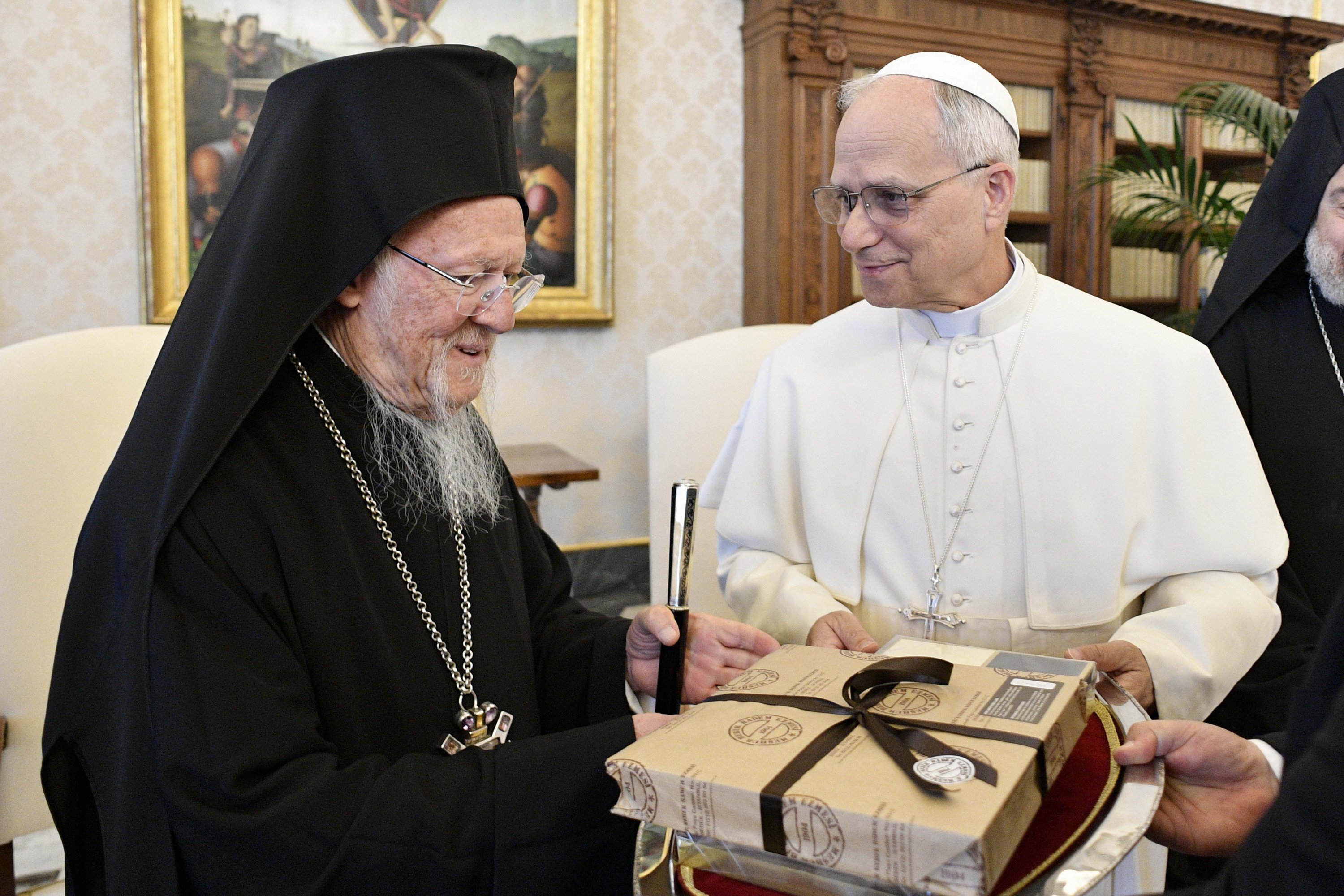Posted on 05/30/2025 21:02 PM (Detroit Catholic)
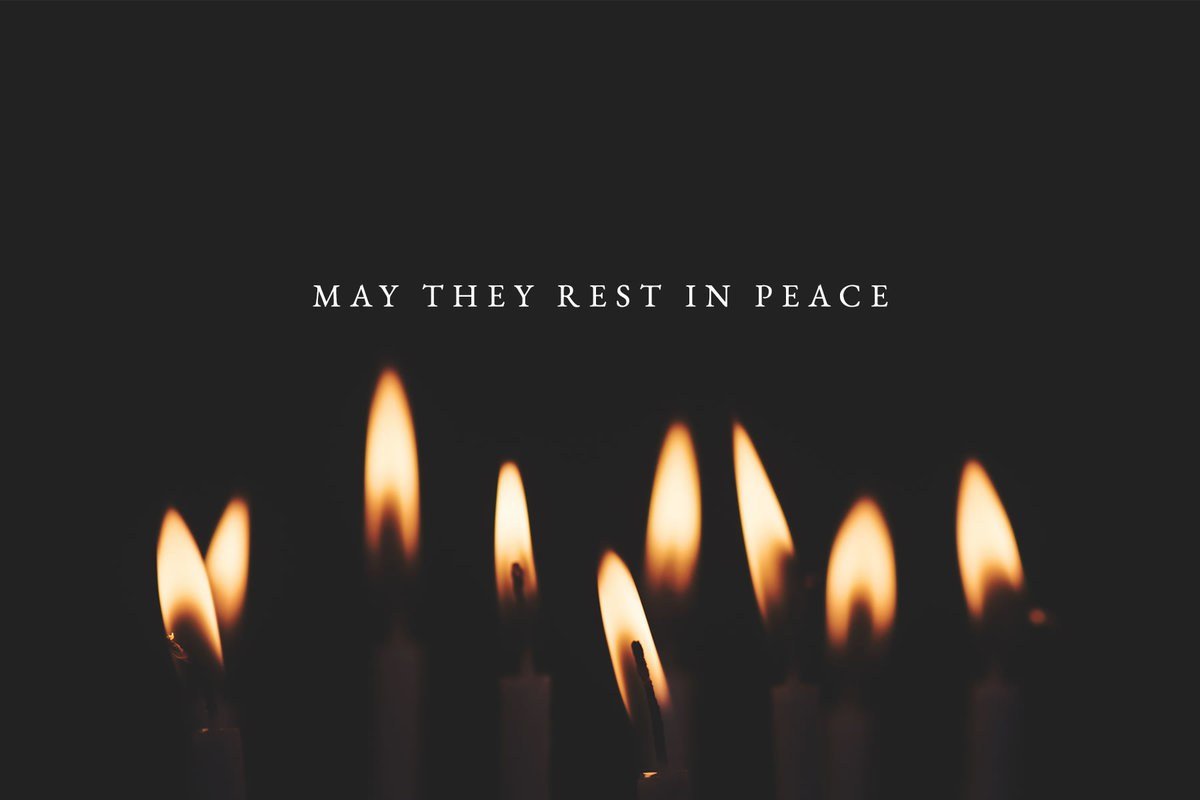
Posted on 05/30/2025 20:53 PM (CNA Daily News)
 Pope Leo XIV smiles during his first general audience in St. Peter's Square on May 21, 2025. / Credit: Daniel Ibanez/CNA
Pope Leo XIV smiles during his first general audience in St. Peter's Square on May 21, 2025. / Credit: Daniel Ibanez/CNA
Lima Newsroom, May 30, 2025 / 16:53 pm (CNA).
Pope Leo XIV encouraged the Anabaptist (Mennonite) movement to live with love the call to Christian unity and the mandate to serve others.
The Holy Father made the statement in a message published May 29 by the Vatican and sent to participants commemorating the 500th anniversary of the Anabaptist movement in Zurich, Switzerland.
At the beginning of his message, Pope Leo emphasized that “by receiving the Lord’s peace and accepting his call, which includes being open to the gifts of the Holy Spirit, all the followers of Jesus can immerse themselves in the radical newness of Christian faith and life. Indeed, such a desire for renewal characterizes the Anabaptist movement itself.”
“The motto chosen for your celebration, ‘The Courage to Love,’ reminds us, above all, of the need for Catholics and Mennonites to make every effort to live out the commandment of love, the call to Christian unity, and the mandate to serve others,” Leo XIV emphasized.
Likewise, the pontiff’s text continues, the motto “points to the need for honesty and kindness in reflecting on our common history, which includes painful wounds and narratives that affect Catholic-Mennonite relationships and perceptions up to the present day.”
“How important, then, is that purification of memories and common re-reading of history that can enable us to heal past wounds and build a new future through the ‘courage to love,’” he pointed out.
“What is more, only in such a way can theological and pastoral dialogue bear fruit, fruit that will last. This is certainly no easy task! Yet, it was precisely at particular moments of trial that Christ revealed the Father’s will: It was when challenged by the Pharisees that he taught us that the two greatest commandments are to love God and our neighbor,” the pope said.
“It was on the eve of his passion,” he noted, “that he spoke of the need for unity, ‘that all may be one… so that the world may believe.’ My wish for each of us, then, is that we can say with St. Augustine: ‘My entire hope is exclusively in your very great mercy. Grant what you command, and command what you will.’”
In the context of “our war-torn world,” the pope continued, “our ongoing journey of healing and of deepening fraternity has a vital role to play, for the more united Christians are the more effective will be our witness to Christ, the prince of peace, in building up a civilization of loving encounter.”
The Mennonites are an Anabaptist Christian group that originated during the Protestant Reformation of the 16th century.
Their name comes from Menno Simons, a Catholic priest who would become an important theologian of this movement.
Distinguishing features of the Mennonites are their pacifism or rejection of war, their emphasis on baptism in adulthood, and their community life in which they share goods and services and work together to maintain the community.
This story was first published by ACI Prensa, CNA’s Spanish-language news partner. It has been translated and adapted by CNA.
Posted on 05/30/2025 20:23 PM (CNA Daily News)
 Father Pedro Bismarck Chau was appointed as a new auxiliary bishop of the Archdiocese of Newark, New Jersey, on May 30, 2025. / Credit: Archdiocese of Newark, New Jersey
Father Pedro Bismarck Chau was appointed as a new auxiliary bishop of the Archdiocese of Newark, New Jersey, on May 30, 2025. / Credit: Archdiocese of Newark, New Jersey
Washington, D.C. Newsroom, May 30, 2025 / 16:23 pm (CNA).
Pope Leo XIV on Friday appointed Nicaraguan-born Father Pedro Bismarck Chau as auxiliary bishop of the Archdiocese of Newark, New Jersey.
The Holy Father also accepted the resignation of 77-year-old Newark Auxiliary Bishop Gregory J. Studerus.
Bishop-elect Chau is a priest of the archdiocese and currently serves as pastor at the Cathedral Basilica of the Sacred Heart, according to a press release from the U.S. Conference of Catholic Bishops.
“I warmly welcome the Holy Father’s appointment of Bishop-elect Pedro Bismarck Chau as an auxiliary bishop for the Archdiocese of Newark,” Newark archbishop Cardinal Joseph W. Tobin said in a statement.
“His deep faith, considerable pastoral experience, and love for the people of God will be a great blessing to our local Church. I look forward to his contribution as we continue our mission to witness to Jesus Christ,” Tobin said.
Chau was born on July 18, 1964, in Managua, Nicaragua, and is bilingual in English and Spanish.
In 2004, Chau received a bachelor’s degree in psychology from Seton Hall University in South Orange, New Jersey. He then studied at Immaculate Conception Seminary there and was ordained to the priesthood on May 24, 2008.
After his ordination, Chau worked as parochial vicar at Our Lady of Mount Virgin in Garfield, New Jersey, assisting the parish priest from 2008–2012.
Chau became very involved in youth programs with the archdiocese, serving as an associate director of the archdiocese’s Youth and Young Adult Ministry and Catholic Youth Organization from 2012–2015.
From 2013–2016, Chau served as the assistant director of vocations for the archdiocese. He also worked as a campus minister at New Jersey Institute of Technology and at the Newman Center at Rutgers University from 2015–2020. During the same time period, he served as pastor at St. John’s Church and St. Patrick Pro-Cathedral.
Chau was appointed to the Priest Personnel Board for the archdiocese in 2017 and served on the board until 2020 when he began his current role as rector of the Cathedral Basilica of the Sacred Heart.
The priest later returned to Seton Hall University to acquire a master’s degree in professional counseling in 2021.
Other ministry work of Chau’s includes serving as the chaplain for the pastoral ministry with the Deaf, working as a professor at Immaculate Conception Seminary, and assisting V Encuentro, an organization that carries out missionary work to benefit the Latino ministry in the United States.
The auxiliary bishop-elect will join auxiliary bishops Manuel A. Cruz, Michael A. Saporito, and Elias R. Lorenzo along with Tobin to serve the estimated 1.04 million Catholics in New Jersey.
Posted on 05/30/2025 19:44 PM (CNA Daily News)
 Pope Leo XIV welcomes representatives of various peace movements to the Vatican on May 30, 2025. / Credit: Vatican Media
Pope Leo XIV welcomes representatives of various peace movements to the Vatican on May 30, 2025. / Credit: Vatican Media
Vatican City, May 30, 2025 / 15:44 pm (CNA).
Pope Leo XIV on Friday stated that authentic peace “takes shape from the ground up” when the differences and conflicts they entail “are not set aside but acknowledged, understood, and surmounted.”
Pope Leo began his address to members of various peace movements, whom he received May 30 at the Vatican, with the same words he greeted the faithful when he was elected on May 8: “Dear brothers and sisters, peace be with you!”
The pontiff thanked them for launching the “Arena of Peace” meeting in Verona in May 2024. The event was chaired by Pope Francis and attended by some 300 delegates representing associations and movements that participated in the event.
Among the groups and movements present in the Clementine Hall on Friday were Mediterranea Saving Humans, Libera, the Italian Network for Peace and Disarmament, Catholic Action leaders, Doctors Without Borders, and the Focolare Movement.
The Holy Father recalled that, on that occasion a year ago, Pope Francis reiterated that building peace begins by “standing alongside victims, seeing things from their point of view.”
This approach, according to Leo XIV, “is essential for disarming hearts, approaches, and mentalities, and for denouncing the injustices of a system that kills and is based on the throwaway culture.”
He particularly noted “the courageous embrace” between Israeli Maoz Inon, whose parents were killed by Hamas, and Palestinian Aziz Sarah, whose brother was killed by the Israeli army. Both were present at today’s audience.
“That gesture remains as a testimony and sign of hope,” he added.
“The path to peace demands hearts and minds trained in concern for others and capable of perceiving the common good in today’s world,” the pope continued.
He pointed out that the path to peace involves everyone and that it “leads to the fostering of right relationships between all living beings.”
In an age like our own, “marked by speed and immediacy,” Leo XIV emphasized the need to “recover the patience required for this process to occur.”
In this context, he explained that “authentic peace takes shape from the ground up, beginning with places, communities, and local institutions, and by listening to what they have to tell us. In this way, we come to realize that peace is possible when disagreements and the conflicts they entail are not set aside but acknowledged, understood, and surmounted.”
The pope therefore urged the peace movement members to promote dialogue with all and to maintain “the creativity and ingenuity born of a culture of peace,” with projects that simultaneously inspire hope.
The Holy Father lamented that “all too much violence exists in the world,” reiterating that, in the face of wars, terrorism, human trafficking, and widespread aggression, “our children and young people need to be able to experience the culture of life, dialogue, and mutual respect.”
“Above all,” the pontiff continued, they need the witness of men and women “who embody a different and nonviolent way of living.” He therefore noted that victims who reject revenge become “the most credible agents of nonviolent peacebuilding processes.”
“Nonviolence, as a method and a style, must distinguish our decisions, our relationships, and our actions,” he added.
He also proposed the Gospel and the Church’s social doctrine as the “constant source of support for Christians in this effort” and also as a “compass for everyone.”
“Because it is, in fact, a task entrusted to all, believers and nonbelievers, who must develop and carry it out through reflection and practice inspired by the dignity of the person and the common good,” Pope Leo emphasized.
In this way, he emphasized that peace rests in the hands of all institutions and therefore invited them to be present “within history as a leaven of unity, communion, and fraternity.”
“Fraternity needs to be recovered, loved, experienced, proclaimed, and witnessed,” the pontiff emphasized before encouraging members of the peace movements to act “with patient perseverance.”
This story was first published by ACI Prensa, CNA’s Spanish-language news partner. It has been translated and adapted by CNA.
Posted on 05/30/2025 18:40 PM (CNA Daily News)
 2025 Bradley Prize recipient Jimmy Lai. / Credit: Courtesy of the Bradley Foundation
2025 Bradley Prize recipient Jimmy Lai. / Credit: Courtesy of the Bradley Foundation
CNA Staff, May 30, 2025 / 14:40 pm (CNA).
Jimmy Lai, the imprisoned pro-democracy advocate and Hong Kong entrepreneur, is the honorary recipient of the 2025 Bradley Prize for his unwavering commitment to free speech, democracy, and journalistic integrity.
His son, Sebastien Lai, accepted the award on his father’s behalf at a ceremony in Washington, D.C., on Thursday. The Bradley Prize recognizes Lai’s role as a Catholic human rights activist standing against one of the world’s most oppressive regimes.
Imprisoned for over four years and currently in solitary confinement, Lai, 77, faces potential life imprisonment under Beijing’s 2020 national security law, which has stifled dissent and suppressed free speech in Hong Kong.
“Jimmy’s extraordinary courage and deeply held beliefs in journalistic integrity, human dignity, and democracy are an inspiration to all who value freedom,” said Rick Graber, president of The Lynde and Harry Bradley Foundation. “His sacrifice serves as a beacon of hope for those fighting against tyranny, and we are proud to award him with an honorary Bradley Prize.”

Lai, the founder of the now-shuttered pro-democracy newspaper Apple Daily, has become a global symbol of resistance against what Graber described as the “oppressive, authoritarian rule” of the Chinese Communist Party.
The former stowaway and child factory worker turned billionaire’s entrepreneurial ventures spanned digital media and retail apparel, but it was his outspoken criticism of the Chinese government’s tightening grip on freedom and democracy in Hong Kong that led to his multiple arrests.
Sebastien Lai told EWTN’s Raymond Arroyo on “The World Over with Raymond Arroyo” on Thursday that he and his family are worried about his father, a diabetic with little to no access to medical care, the sacraments, or natural light in his “more than 1,600 days” in solitary confinement.
“It’s just cruelty what they’re doing to him” in prison, Sebastien said, “and he needs to be released immediately.”
President Donald Trump has said he would include Jimmy Lai’s release as part of ongoing negotiations with China. Sebastien met with members of the Trump administration in March, telling Arroyo he is “hopeful” and is grateful for the president’s “moral clarity” regarding his father’s case.
Though the elder Lai is a British citizen and could have fled, he chose to remain in Hong Kong, advocating for his principles. Sebastien said he has not yet met with Prime Minister Keir Starmer but he is hopeful the British government will help bring about his father’s release.
The Lynde and Harry Bradley Foundation, based in Milwaukee, established the Bradley Prize in 2004 to honor individuals whose work strengthens the principles of American exceptionalism, limited government, free markets, and civil society. Each recipient receives a $250,000 to $300,000 stipend for contributions in areas such as constitutional order, education, and cultural vitality.
Past recipients include economist Thomas Sowell; journalists William Kristol and Charles Krauthammer; Robert P. George; and Mary Ann Glendon, the Harvard Law School professor emeritus who also served as the first woman president of the Pontifical Academy of Social Sciences.
Sebastien asked EWTN viewers to write to their elected representatives in Washington asking for Jimmy’s release and to “say a little prayer and light a candle” for his freedom. He expressed hope that Pope Leo XIV, who asked for prayers for the people in China this past Sunday, would also call for Jimmy Lai’s release.
“It is such a clear case of a persecuted Christian,” Sebastien said of his father’s imprisonment. The pope’s support of Lai “would give the people in China hope. It would definitely give my father hope.”
He said his father’s faith is his “pillar,” and although he is physically weak, he is “spiritually and intellectually” strong. “He knows he is doing the right thing by God.”
The Chinese government wants his father to think that “he’s fighting by himself in his little cell,” Lai said. “But he’s not. He’s fighting for everybody’s freedom.”
“A man’s courage to give up everything he has to fight for what is right reverberates through time,” he said.
Posted on 05/30/2025 17:38 PM (CNA Daily News)
 Cardinal Willem Eijk. / Credit: Bohumil Petrik/CNA
Cardinal Willem Eijk. / Credit: Bohumil Petrik/CNA
Vatican City, May 30, 2025 / 13:38 pm (CNA).
Cardinal Willem Eijk on Friday said the Pontifical Academy for Life should give more attention to the bioethical issues linked to “gender affirming” therapies and “transgender” treatments.
The Dutch cardinal, a physician and member of the Pontifical Academy for Life, opened the third annual conference organized by the platform International Chair of Bioethics Jérôme Lejeune, taking place in Rome from May 30–31. The theme of this year’s conference is “The Splendor of Truth in Science and Bioethics.”
In an exclusive interview with EWTN Vatican News Director Andreas Thonhauser, the cardinal archbishop of Utrecht, Netherlands, said that in addition to artificial intelligence, the Church needs to come together to discuss the impact of gender-affirming treatments.
“They are now very popular and they are now well accepted in many countries,” he said in the interview.
“I’m glad that now in the United States, this gender discussion is a little bit pushed back and it has also had a positive influence on Western European societies,” he added.
According to Eijk, the Pontifical Academy for Life has more opportunity to talk about the Church’s teachings on the relationship between sex and gender at a time when the appeal of “gender theory” appears to be now “less strong” than it was in the past.
“So we see that the gender discussion was very strong, you know, a few years ago,” he said. “They were almost pushing gender theory in society, culture, and also educational programs at elementary schools.”
“Now there is a lot of resistance and you can see that many people are now wondering should we do that with our young people?” he added. “So at least, you know, the question is coming up, is it right to do so?”
Although Eijk expressed dismay that “dualistic philosophies” — which fundamentally divide the mind and body as opposing forces — have more influence on scientific discourse and medical practice, he believes the Church can still speak about the intrinsic value of the human person as God’s creation that should be respected.
“According to our Catholic view of man, biological sex is an intrinsic part of the dimension of the human being,” he said. “Transmitting the truth with regard to biological sex and relationship between gender and biological sex is an element of creation and it’s something that you’d respect.”
Though the cardinal noted that many people are inclined to view the body as an “exigent object” that you can use to express yourself or adapt to your taste, he said that a Church that is united in teaching can be very helpful for Catholic faithful who want to uphold the dignity of human life.
“And when we proclaim this truth in an unambiguous way, in a clear way, I think that people will not be confused anymore but can start to rethink about the basic truths of life and especially basic truths concerning Christ and Christian morality,” he shared.
Earlier this week, Pope Leo XIV appointed Monsignor Renzo Pegoraro, a bioethicist with a medical degree, as the new president of the Pontifical Academy for Life succeeding Archbishop Vincenzo Paglia. Pegoraro has served as the Vatican academy’s chancellor since September 2011.
Posted on 05/30/2025 16:53 PM (Detroit Catholic)
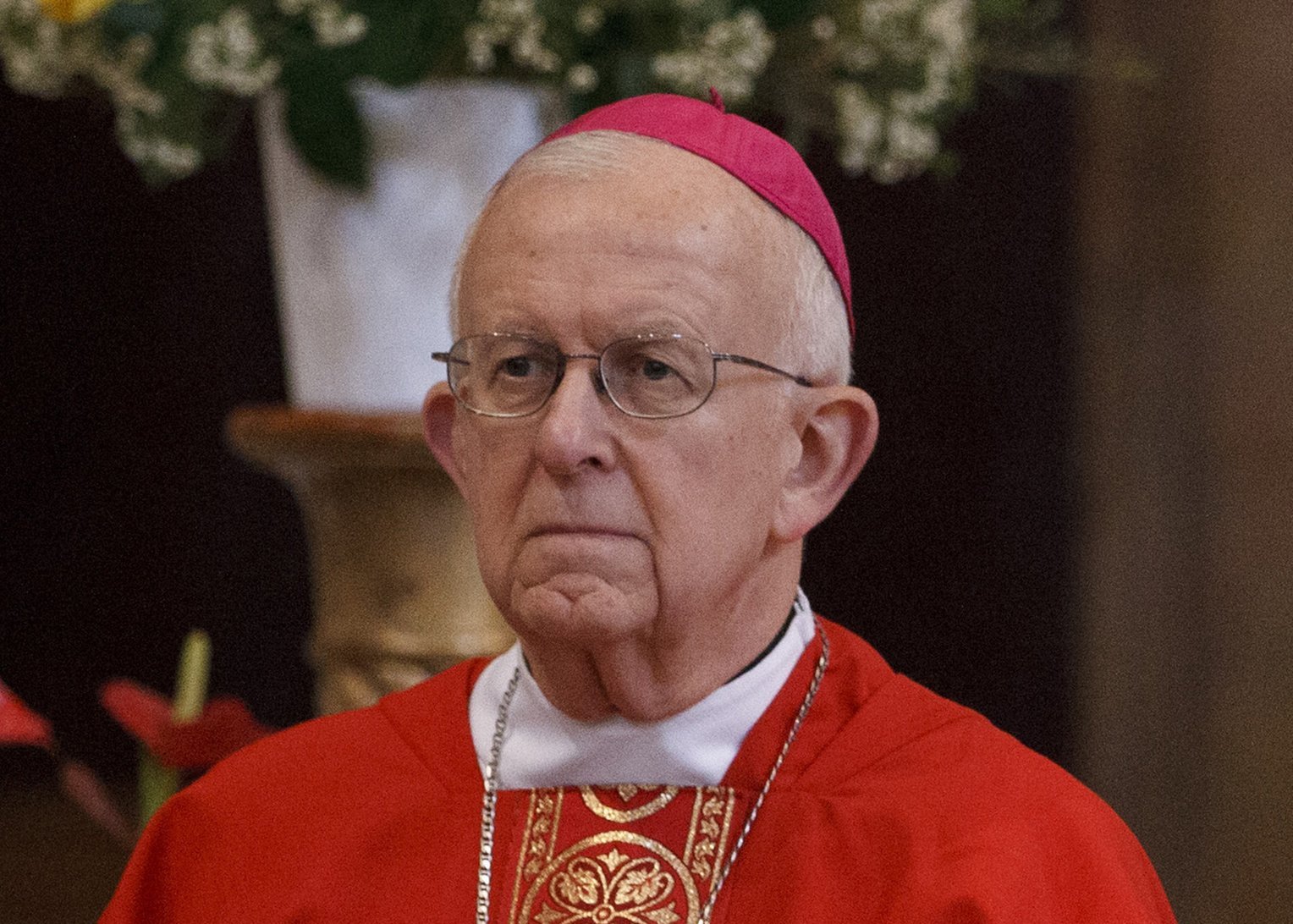
Posted on 05/30/2025 16:49 PM (Detroit Catholic)
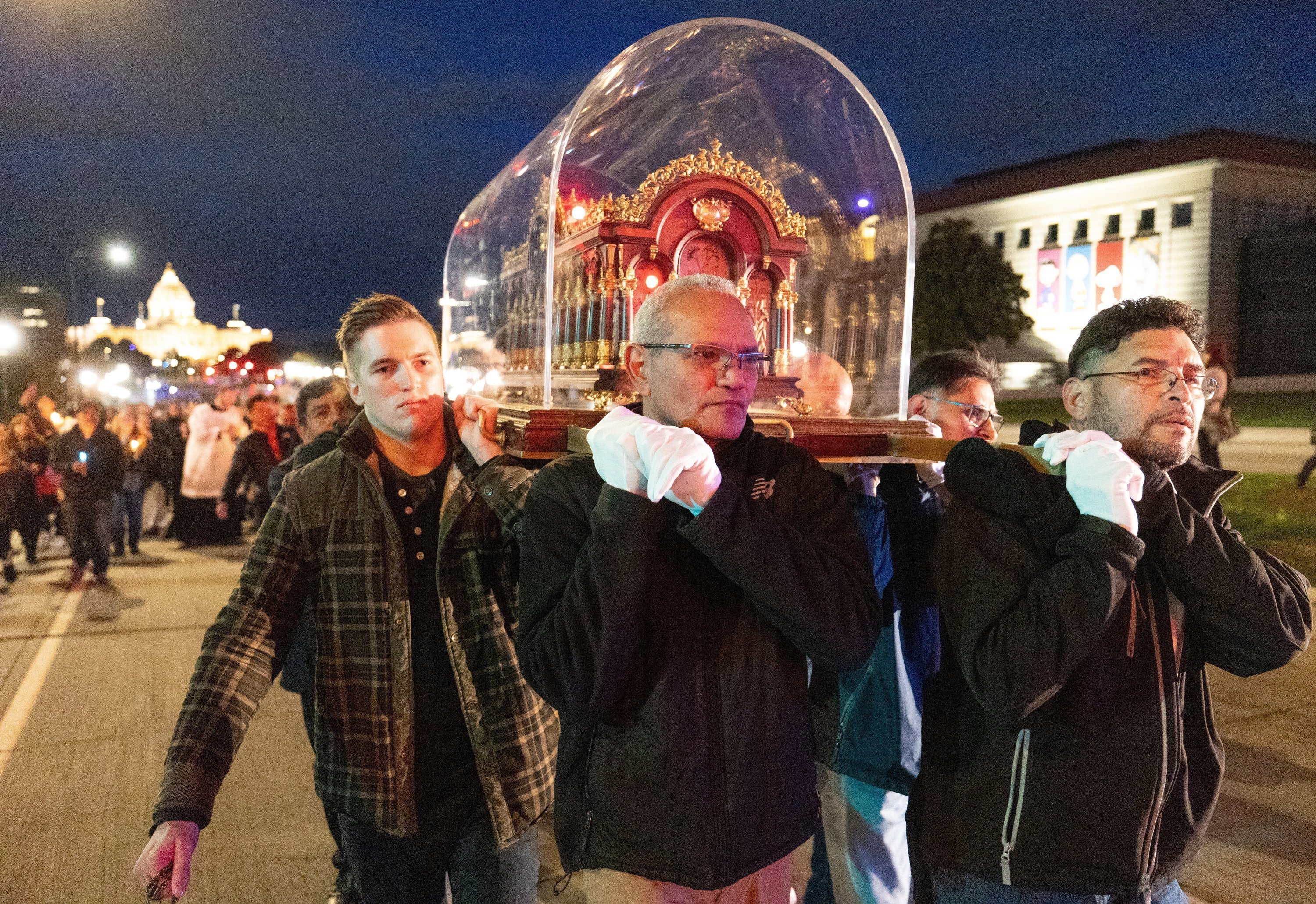
Posted on 05/30/2025 16:47 PM (Detroit Catholic)
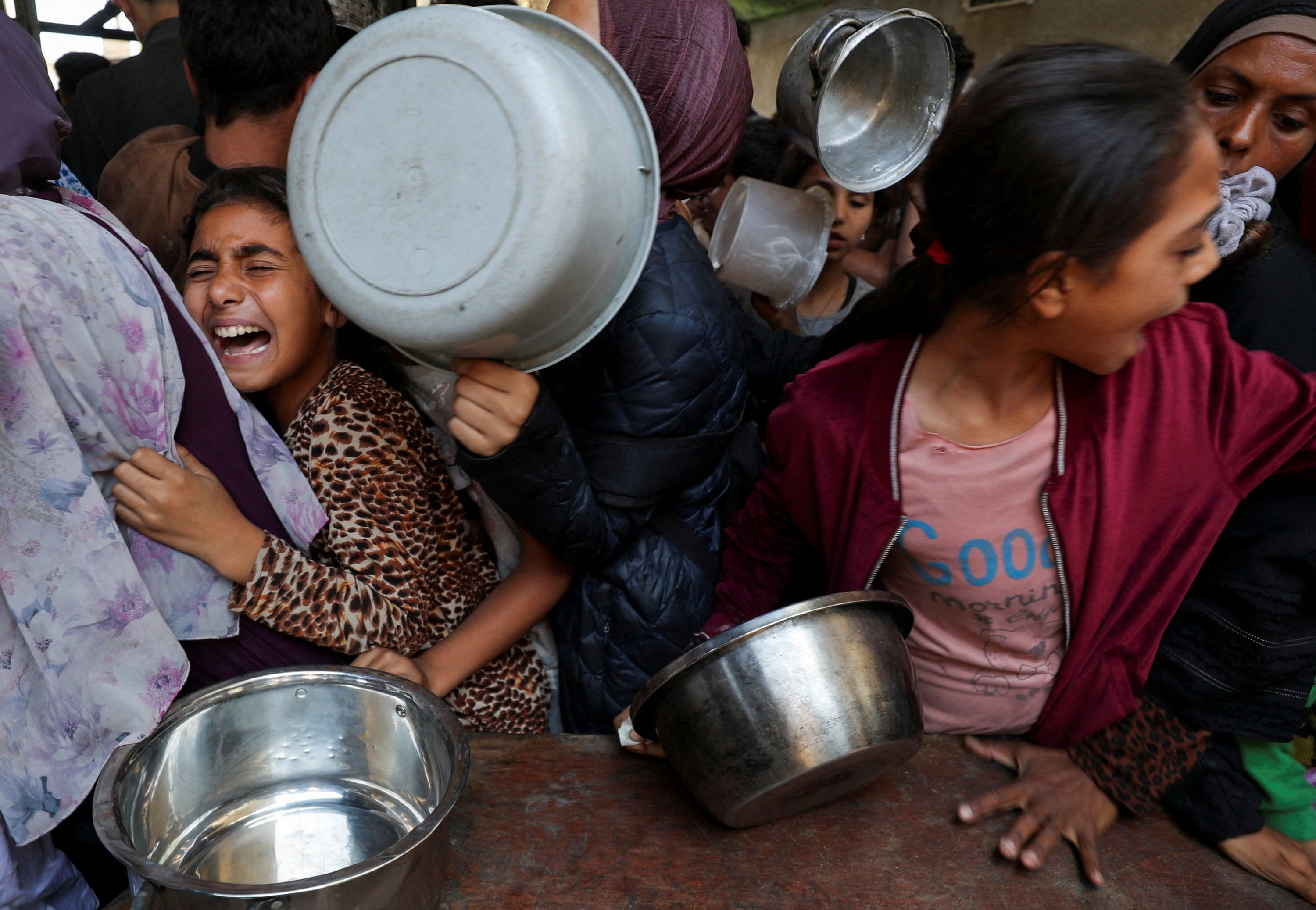
Posted on 05/30/2025 16:45 PM (Detroit Catholic)
